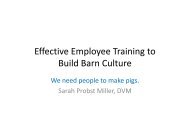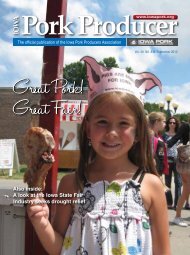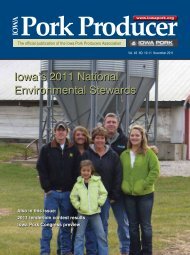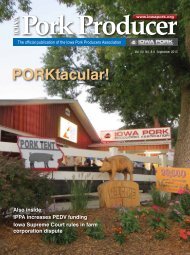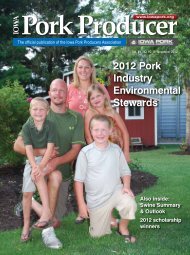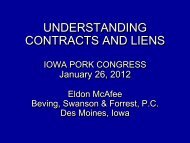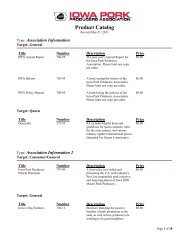Pork Congress 2012 - Iowa Pork Producers Association
Pork Congress 2012 - Iowa Pork Producers Association
Pork Congress 2012 - Iowa Pork Producers Association
Create successful ePaper yourself
Turn your PDF publications into a flip-book with our unique Google optimized e-Paper software.
<strong>2012</strong> <strong>Iowa</strong> <strong>Pork</strong> <strong>Congress</strong> Re-Cap<br />
Mastering Meaty Messages:<br />
Keynote speaker decodes activist communications, urges producers to<br />
speak out<br />
By Darcy Maulsby<br />
Ever wonder why activist groups have been so effective<br />
at attacking animal agriculture and influencing public<br />
opinion? It starts with the power of persuasion.<br />
“These groups know that pet-owning, meat-eating<br />
consumers have one animal in their heart and one<br />
on their plate,” said Dr. Wes Jamison, an associate<br />
professor of communication at Palm Beach Atlantic<br />
University who was the keynote speaker at the <strong>2012</strong><br />
<strong>Iowa</strong> <strong>Pork</strong> <strong>Congress</strong>. “Activist groups excel at repeating<br />
simple, easy-to-understand messages that are relevant<br />
to this audience.”<br />
Animal rights activism often functions like a religious<br />
belief, added Jamison, who noted that this belief<br />
stresses that livestock confinement systems go against<br />
God’s natural order. To spread their message, groups<br />
like the Humane Society of the United States (HSUS)<br />
have taken a faith-based communications approach<br />
(www.humanesociety.org/about/departments/faith/) that:<br />
• Targets pet owners and taps into their feelings<br />
about companion animals to undermine animal<br />
agriculture. People who love their cat or dog are<br />
made to feel bad about having one animal as a<br />
“family member” while eating other animals for food,<br />
said Jamison, who noted that it’s not unusual for<br />
these people to be willing to spend $4,000 on a hip<br />
replacement for a 12-year-old poodle. “Today’s urban<br />
society views animals in a fundamentally different way<br />
than we have in the past. The public has lost contact<br />
with their food supply, and the contact that they do<br />
have with animals is much different than when we<br />
were an agrarian society. People are now encouraged<br />
to view production agriculture animals in the same<br />
way they view their pets.”<br />
Dr. Wes Jamison makes a point during his keynote address at the <strong>2012</strong> <strong>Iowa</strong> <strong>Pork</strong> <strong>Congress</strong>.<br />
24 March <strong>2012</strong>




